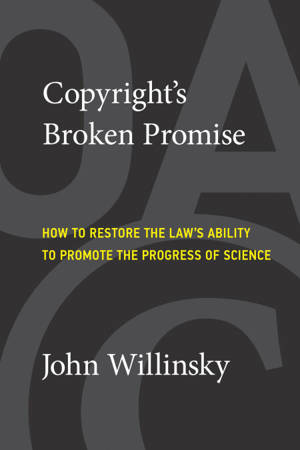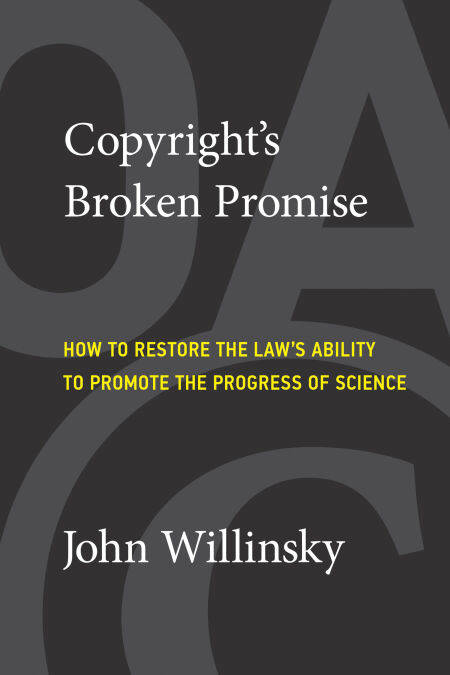
Bedankt voor het vertrouwen het afgelopen jaar! Om jou te bedanken bieden we GRATIS verzending (in België) aan op alles gedurende de hele maand januari.
- Afhalen na 1 uur in een winkel met voorraad
- In januari gratis thuislevering in België
- Ruim aanbod met 7 miljoen producten
Bedankt voor het vertrouwen het afgelopen jaar! Om jou te bedanken bieden we GRATIS verzending (in België) aan op alles gedurende de hele maand januari.
- Afhalen na 1 uur in een winkel met voorraad
- In januari gratis thuislevering in België
- Ruim aanbod met 7 miljoen producten
Zoeken
Copyright's Broken Promise E-BOOK
How to Restore the Law's Ability to Promote the Progress of Science
John Willinsky
E-book | Engels
€ 27,59
+ 27 punten
Omschrijving
A comprehensive proposal for reforming copyright law to ensure sustainable public access to research and scholarship.
Open access is widely supported by researchers, librarians, scholarly societies, and research funders, as well as large and small publishers. Yet despite this support—and the pandemic’s demonstration of the importance of open access for scientific progress—the scholarly publishing market is failing to deliver open access quickly enough. In Copyright’s Broken Promise, John Willinsky presents the case for reforming copyright law so that it supports, rather than impedes, public access to research and scholarship. He draws on the legal strategy of statutory licensing to set out the terms and structures by which the Copyright Act could ensure that publishers are fairly compensated for providing immediate open access.
What sets Willinsky’s analysis apart is its focus on the current state of scholarly publishing. Because copyright offers so little legal support for moving publishing to open access, though it is best for science, he says it is time to stop regarding the Copyright Act as a law of nature that can only be circumvented, contravened, or temporarily set aside. Specifically, he proposes that the Copyright Act add a new category of work, called “research publications,” which would be subject to statutory licensing. This would allow publishers to receive royalty payments from the principal institutional users (universities, industry R&D, research institutes, and so on) and sponsors of the work (foundations and government agencies), while providing immediate open access.
Open access is widely supported by researchers, librarians, scholarly societies, and research funders, as well as large and small publishers. Yet despite this support—and the pandemic’s demonstration of the importance of open access for scientific progress—the scholarly publishing market is failing to deliver open access quickly enough. In Copyright’s Broken Promise, John Willinsky presents the case for reforming copyright law so that it supports, rather than impedes, public access to research and scholarship. He draws on the legal strategy of statutory licensing to set out the terms and structures by which the Copyright Act could ensure that publishers are fairly compensated for providing immediate open access.
What sets Willinsky’s analysis apart is its focus on the current state of scholarly publishing. Because copyright offers so little legal support for moving publishing to open access, though it is best for science, he says it is time to stop regarding the Copyright Act as a law of nature that can only be circumvented, contravened, or temporarily set aside. Specifically, he proposes that the Copyright Act add a new category of work, called “research publications,” which would be subject to statutory licensing. This would allow publishers to receive royalty payments from the principal institutional users (universities, industry R&D, research institutes, and so on) and sponsors of the work (foundations and government agencies), while providing immediate open access.
Specificaties
Betrokkenen
- Auteur(s):
- Uitgeverij:
Inhoud
- Aantal bladzijden:
- 184
- Taal:
- Engels
Eigenschappen
- Productcode (EAN):
- 9780262371476
- Verschijningsdatum:
- 5/12/2022
- Uitvoering:
- E-book
- Beveiligd met:
- Adobe DRM
- Formaat:
- ePub

Alleen bij Standaard Boekhandel
+ 27 punten op je klantenkaart van Standaard Boekhandel
Beoordelingen
We publiceren alleen reviews die voldoen aan de voorwaarden voor reviews. Bekijk onze voorwaarden voor reviews.









